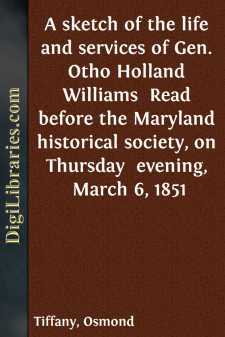Categories
- Antiques & Collectibles 13
- Architecture 36
- Art 48
- Bibles 22
- Biography & Autobiography 813
- Body, Mind & Spirit 141
- Business & Economics 28
- Children's Books 12
- Children's Fiction 9
- Computers 4
- Cooking 94
- Crafts & Hobbies 4
- Drama 346
- Education 46
- Family & Relationships 57
- Fiction 11826
- Games 19
- Gardening 17
- Health & Fitness 34
- History 1377
- House & Home 1
- Humor 147
- Juvenile Fiction 1873
- Juvenile Nonfiction 202
- Language Arts & Disciplines 88
- Law 16
- Literary Collections 686
- Literary Criticism 179
- Mathematics 13
- Medical 41
- Music 40
- Nature 179
- Non-Classifiable 1768
- Performing Arts 7
- Periodicals 1453
- Philosophy 64
- Photography 2
- Poetry 896
- Political Science 203
- Psychology 42
- Reference 154
- Religion 513
- Science 126
- Self-Help 83
- Social Science 81
- Sports & Recreation 34
- Study Aids 3
- Technology & Engineering 59
- Transportation 23
- Travel 463
- True Crime 29
A sketch of the life and services of Gen. Otho Holland Williams Read before the Maryland historical society, on Thursday evening, March 6, 1851
by: Osmond Tiffany
Categories:
Description:
Excerpt
Mr. President:
The events of the American Revolution are so nearly connected with our own times, that the actors in that great struggle seem yet to be to us as living men. We open the portal of the past century, and are with those who once like ourselves, breathed and thought, and who now, lie not silent or forgotten in the tomb.
Their deeds live in our memory; their examples are glorious as of old: their words of hope in dark hours, and of their joy in success, still burn before us:—they have become the great historians of their age. Among this band of gallant men, who gave themselves with all their soul to liberty, I could name none of our native State, who displayed a more patient, disinterested, and zealous spirit, than the pure and chivalrous Otho Holland Williams.
He was born in the county of Prince George's, in March, 1749. His parentage was highly respectable, his ancestors emigrating from Wales, and he being of the second generation after their settlement in Maryland.
Had his days been wholly passed in the enjoyment of peace, his influence would not have been lost. He would still have left to his friends the same invaluable legacy of a good name, but it was his fortune to deserve and gain a wider celebrity. He was his father's oldest son, and in the year succeeding his birth, his home was changed to the mouth of the Conococheague Creek, in Frederick, near Washington county. In that beautiful region of country, watered by the stream that lends its name to the valley, were spent the few short years of his boyhood. There he learned to love the aspect of fields and groves, the memory of which was his solace long after, in many dark and trying hours, for we find in the midst of the toils of the camp, that his spirit yearns for rural peace and solitude. The love of nature is ever ennobling; it perhaps contributed to form the character of the future hero.
It is a favorite theme with biographers to dwell on parental precepts, especially on those of the mother. We have no anecdotes of this period, but we may yield to a happy idea, and imagine young Williams listening to the accents of a mother's lip, with the true deference which he always paid to goodness. We may see him, among his little playmates on his father's farm, already showing those traits of character, which guided him in the path to honor: that love of truth, that physical and moral courage, which won in time the confidence of his great commander-in-chief, who had himself early shone in the same qualities. We may picture him crossing the fields, at early morning hours, to the rustic school, there to recite the simple lesson, and to be instructed in his mother tongue, which he afterwards used with the grace of a scholar. But the sunshine of his boyhood was soon clouded—his father, Joseph Williams, died, leaving but a small property to seven children; and Otho at the age of thirteen, was thrown upon his own exertions. He was placed with his brother-in-law, Mr. Ross, in the Clerk's Office of Frederick county....


